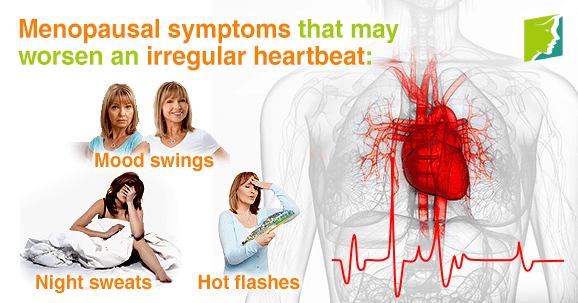Suffering from an irregular heartbeat is one of the lesser known symptoms during menopause. They are rarely serious, though if you are worried you should visit your doctor. Irregular heartbeat is often connected to fluctuating hormones. Continue reading to learn more about occasional irregular heartbeats.
What Is an Irregular Heartbeat?
An occasional irregular heartbeat is when you experience the feeling or sensation of heart palpitations. Though this is a common experience, it can be alarming. A normal heartbeat beats at around 60-100 beats per minute. If your heartbeat drops under or over this, it considered an irregular heartbeat.
What it Feels Like?
An irregular heartbeat can feel like many things. It could feel like your heart is racing or pounding, or it may be more aptly described as fluttering or skipped beats. You may feel like you are an unpleasant awareness of your own heartbeat. The rhythm of your heart can stay regular or become irregular when you are suffering from palpitations.
Causes of Irregular Heartbeat
There can be many causes of irregular heartbeats. During menopause, the most likely culprit is hormonal imbalance. The rising and lowering levels of estrogen and progesterone can cause a raft of different symptoms. Coping with these different symptoms, for example mood swings, hot flushes, and night sweats, can inevitably cause stress. Stress in turn can also heighten your risk of and cause an irregular heartbeat.
What Can Be Done?
Fortunately, there are things that you can do in order to banish an occasional irregular heartbeat. There are several natural ways of relieving an irregular heartbeat. Drinking cold water or splashing cold water on your face when you feel your heart beating irregularly can help end the sensation. Getting enough sleep and taking time to spend relaxing and doing something you enjoy can also reduce the likelihood of suffering an occasional irregular heartbeat in the long run.
Though many women suffer from an occasional irregular heartbeat during menopause, it can be confusing and distressing for the individual going through it. The best way to arm yourself for coping with this symptom is by knowing why it happens and what you can do about it. However, if you have any worries or concerns over your heartbeat you should seek advice from your doctor.
Sources
- National Health Service UK. (2012). Heart palpitations. Retrieved October 24, 2013, from http://www.nhs.uk/conditions/Heart-palpitations/Pages/Introduction.aspx


